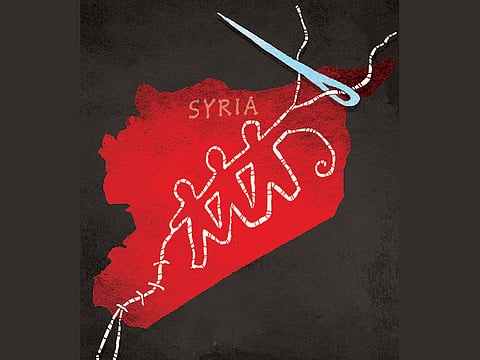Syria continues to fester, seven years on
Eastern Ghouta is the latest example of the war’s tragic outcome as civilians continue to experience unspeakable suffering and bloodshed

The mayhem in Syria, now ending its seventh year and marching towards its eighth, is a political travesty where only civilians seem to be paying the price of a pointless civil war. The human toll is a reminder of a repetitive cycle of violence of more killing fields and destruction in Syrian cities and towns like Madya, Aleppo, Adlib and many other places. In all these years of war, Syria has become a chessboard for power games where madness rides over reason and logic; and where death and annihilation rule the day.
Judging by the daily killings and large-scale displacement of Syrian people, which now stands around 12 million (around half of the population of the country), there is little hope that things may improve in the near future. This is regardless of the new strategic situation on the ground and new combative spirit of the government forces that were long given a breather by their new cohorts — the Russian military, which intervened in the Syrian war in September 2015 and tipped the balance in favour of Syrian President Bashar Al Assad’s regime. Thus, the new onslaught on Eastern Ghouta, which started on February 18, is part of this Russian military equation. The Syrian regime believes that it now has a great opportunity to expel rebel factions in Eastern Ghouta (under Russian cover with support from Iran and Hezbollah) and gain more legitimacy.
Indeed, after retaking Aleppo in December 2016, the government has adopted a piecemeal strategy to regain control over the rest of the country. The ongoing attacks on Eastern Ghouta are clearly from this perspective regardless of the fact that this enclave — a mixture of urban dwelling, towns and villages as well as rich farmland areas, once dubbed as the breadbasket for Damascus — is certainly not the last stronghold of the rebels. After Eastern Ghouta, the government is almost certain to move to other parts of the country to reinforce its rule despite the resistance it will surely encounter.
It would be an understatement to say regime forces are just attacking opposition strongholds for two reasons: They are among population centres and they are attacking and bombing indiscriminately. A United Nations satellite imagery analysis suggests that 93 per cent of the buildings and homes in Eastern Ghouta, which has around 14 neighbourhoods, has been destroyed. That was back in December 2017. Today, the total destruction is almost assured.
Civilians are experiencing the worst-ever situation in Ghouta. They have no food or medicines, nothing but the clothes on their back and are hiding in underground shelters. Many haven’t seen sunlight since the latest onslaughts for fear of being bombed from the sky. Because of the intensity of the fighting, UN convoys are unable to get through.
UN Secretary-General Antonio Guterres has already called the situation in Eastern Ghouta as “hell on earth”. UN Commissioner for Human Rights, Prince Zeid bin Ra’ad, noted that the Syrian government’s claims about protecting the population is “frankly ridiculous” and that what people are facing is an “apocalypse intended, planned and executed” by the government.
The diplomatic efforts underpinned by the new UN Security Council Resolution 2401 — passed on February 24, 2018, calling for a 30-day truce — is not being observed by the government forces and the warring factions. There is plenty of pep talk coming from the Russians who are offering safe passage to the trapped families and fighters, but the region is under a relentless campaign of shelling and air strikes. It is indeed difficult to carry out such evacuations under these circumstances because of the lack of trust and the fact that there are no confidence-building measures. It is almost certain that government forces will continue to attempt to “flatten Eastern Ghouta” in an attempt to establish its control.
It is too early to say how the situation will develop in the coming weeks although there are murmurs on evacuation efforts in Eastern Ghouta. In any case, looking at the distress and dejection around, one hopes that peace prevails soon enough in Syria so that the suffering of the masses doesn’t prolong any more.
Marwan Asmar is a commentator based in Amman. He has long worked in journalism and has a PhD in Political Science from Leeds University in the UK.



